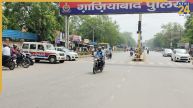Lakshmana Venkat Kuchi, Senior Journalist
@kvlakshman
Yes, this here little fishing community in coastal villages of Uppada Mandal near Kakinada welcomes cyclones and in fact looks forward to them – and many fishermen and fisherwomen headed out to the seashore on Saturday, ignoring warnings from the authorities about Cyclone Mandous. They were all on a “Gold hunt”.
Hundreds of fisherfolk from the 16 villages of the Uppada mandal, famous for handwoven cotton sarees, are out on the stretch of 2 km on the beach, looking for small bits and pieces of gold that washes ashore during cyclones.
For the past four decades or so, the talk in the villages nearby, is that small, small pieces of gold ornaments get washed to the shore in this stretch.
Folklore has it that a small temple nearby was submerged during one of the severe cylonic storm some forty years ago, and it is believed that gold belonging to the temple, broken into tiny pieces sitting settled somewhere on the bottom of the sea gets churned by cyclonic waves and they get deposited on the beach.
Cyclone Mandous, that affected Chennai and parts of Tamil Nadu and Andhra Pradesh, was no different and hoards of fisherfolk thronged the Uppada beaches, hunting for gold.
Said a local media person G Kesavudu, who has been watching this Gold Rush for the past many years, “this time too, we could see many people searching for gold right from 6 a.m. and this operation continues till dusk.”
Often, the fisherfolk are silent about what they find, melt the pieces, and sell off whatever their finding. But authorities keep a close eye on the operations, and any catch is supposed to be given to the authorities, he said.
Uppada Mandal Revenue Officer GVN Prasad confirmed the ‘Gold Rush’ but said many people ignored the warnings of police and disaster management authorities because of their ‘greed and hope’ of finding gold. Maybe once or twice in many years, someone did find a small piece of gold deposited deep in the sand inside the sea that gets stirred up by cyclone and reaches the beach. “But largely there are rumours, and hardly anyone finds any gold, but yes many people come to try their luck,” Prasad said.
On Saturday, a fisherwoman got lucky and found a piece of golden earring, and for her, the time, energy, and money were well spent.
“Why there are some fishermen who ‘employ’ people to carry out searches, paying Rs 100 or Rs 200 per 12-hour shift to search the beach for gold,” said another local who preferred to remain anonymous.
One spot that gets many “Gold Hunters” is the one km stretch Kothapatnam village of Kothapalli Mandal that is neighbouring Uppada.
But where does the gold come from?
About this there are a few theories, about a temple getting submerged that is very popular. But, said Prasad, “during previous cyclones, a few houses along with belongingssubmerged. Often during cylones, the belongings settled on the sea bed gets disturbed and they may get thrown around. People believe that even golden ornaments get to the shore,’ Prasad said.
Another theory about the presence of gold in sea is that often women take bath in the sea wearing ornaments, and sometimes lose them. It is this lost gold that may get washed across to the seashore during cyclones, said another local, explaining the origins of the gold, that is leading to the Gold Rush during cyclones.
And this phenomenon is not limited to Uppada in Andhra Pradesh but is known to be taking place at many places along the shoreline, and also on riverbeds located near temples.
(Lakshmana Venkat Kuchi is a senior journalist tracking social, economic, and political issues and takes a keen interest in sports as well. He has worked with prominent news organisations.)













